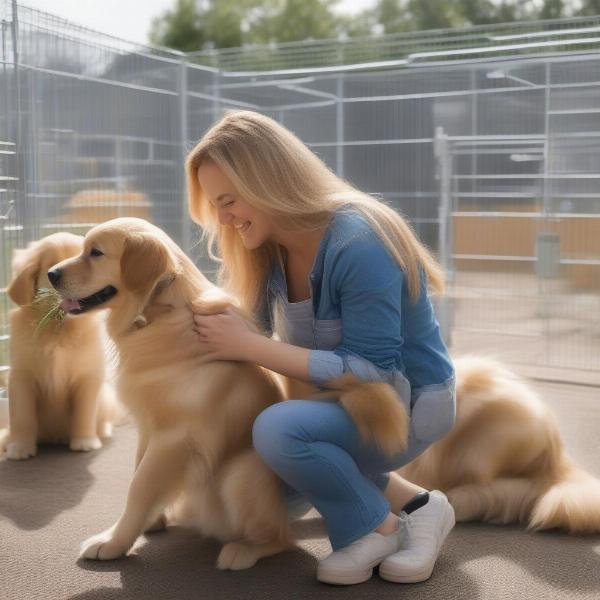Understanding the different types of dog breeders is crucial when searching for a new furry companion. Whether you’re looking for a specific breed or simply want to ensure your new dog comes from a responsible and ethical source, this article will guide you through the various types of dog breeders, helping you make an informed decision and find the perfect puppy for your family.
Different Approaches to Dog Breeding
There’s a wide spectrum of dog breeders, each with their own philosophies and practices. Understanding these differences is key to making the right choice. Here are the main types you’ll encounter:
Responsible Breeders
Responsible breeders prioritize the health and well-being of their dogs above all else. They carefully select breeding pairs based on temperament, health testing, and conformation to breed standards. They provide excellent care for their dogs and puppies, ensuring proper socialization and veterinary attention. Responsible breeders are knowledgeable about their chosen breed and are happy to answer your questions, provide guidance, and offer ongoing support. They also typically screen potential buyers to ensure their puppies go to loving, suitable homes.
 Responsible Dog Breeder
Responsible Dog Breeder
Backyard Breeders
Backyard breeders often breed dogs without proper knowledge of genetics, health testing, or breed standards. Their primary motivation is often profit, and they may not prioritize the health or well-being of their dogs. Puppies from backyard breeders are at a higher risk of health and behavioral problems. They are often raised in less than ideal conditions and may not receive adequate socialization.
Puppy Mills
Puppy mills are large-scale commercial breeding facilities that prioritize profit over animal welfare. Dogs in puppy mills often live in cramped, unsanitary conditions and receive minimal veterinary care. They are bred repeatedly, leading to health problems and genetic defects in their puppies. Purchasing a puppy from a puppy mill supports this cruel industry.
Hobby Breeders
Hobby breeders typically breed dogs on a smaller scale than commercial breeders, often focusing on a single breed. They usually have a genuine love for their dogs and strive to produce healthy, well-tempered puppies. However, their knowledge and resources might be limited compared to responsible breeders.
Show Breeders
Show breeders aim to produce dogs that conform to breed standards and excel in dog shows. They typically conduct thorough health testing and carefully select breeding pairs. While show breeders often produce high-quality dogs, it’s essential to ensure their focus on conformation doesn’t overshadow the importance of temperament and overall health.
Backstreet Breeders
Backstreet breeders operate illegally, often selling puppies in public places or online. They avoid regulation and often misrepresent their dogs’ backgrounds and health. Buying from a backstreet breeder carries significant risks, as you have little recourse if the puppy develops health or behavioral problems.
Choosing the Right Breeder
Finding a responsible breeder is essential for getting a healthy, well-adjusted puppy. Ask potential breeders about their breeding practices, health testing protocols, and how they socialize their puppies. A reputable breeder will welcome your questions and be happy to provide you with information. Don’t be afraid to ask for references from previous puppy buyers.
Conclusion
Choosing the right type of dog breeder is a crucial step in bringing a new furry friend into your home. By understanding the different types of breeders and asking the right questions, you can ensure you’re getting a healthy, well-adjusted puppy from a responsible source. This will not only bring you years of joy but also contribute to the ethical treatment of dogs.
FAQ
-
How can I identify a responsible breeder? A responsible breeder prioritizes the health and well-being of their dogs, conducts health testing, and carefully screens potential buyers.
-
What are the risks of buying from a puppy mill? Puppies from puppy mills are at a higher risk of health and behavioral problems due to poor breeding practices and living conditions.
-
What should I ask a potential breeder? Ask about their breeding practices, health testing protocols, socialization methods, and ask for references from previous buyers.
-
Why is it important to avoid backyard breeders? Backyard breeders often lack the knowledge and resources to properly care for their dogs and puppies, leading to potential health and behavioral issues.
-
Where can I find a reputable breeder? Breed-specific rescue organizations, national breed clubs, and referrals from veterinarians are good places to start.
-
What is the difference between a hobby breeder and a show breeder? Hobby breeders breed on a smaller scale and may not prioritize conformation to breed standards as much as show breeders.
-
Why are backstreet breeders illegal? They operate outside of regulations and often misrepresent their dogs’ backgrounds and health, putting both dogs and buyers at risk.
Related Articles on ILM Dog
About ILM Dog
ILM Dog is your trusted resource for everything related to dog care and companionship. We offer expert advice on dog breeds, health, training, nutrition, grooming, and much more. Whether you are a seasoned dog owner or just starting your journey with a new puppy, ILM Dog provides practical tips and valuable insights to help you provide the best possible care for your canine friend. For any inquiries or to learn more about our services, please reach out to us via email at [email protected] or phone at +44 20-3965-8624.